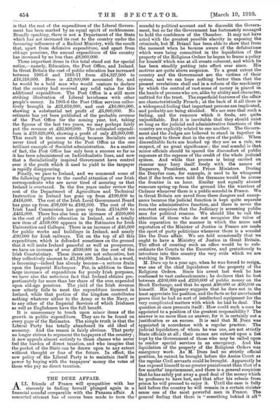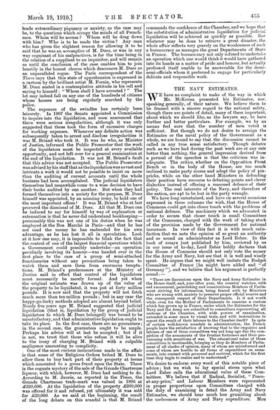tHal DUEZ AFFAIR.
ALL friends of France will sympathise with her sincerely in finding herself plunged again in a financial scandal comparable with the Panama affair. A concerted attempt has of course been made to turn the scandal to political account and to discredit the Govern- ment, but so'far the Government has fortunately managed to hold the confidence of the Chamber. It may not have acted with the greatest possible alacrity in exposing the criminals, but M. Briand has been able to show that from the moment when he became aware of the defalcation* which were being committed in the liquidation of the property of the Religious Orders he began to frame a policy for himself which was at all events coherent, and which he has been steadily putting into effect ever since. His motives are quite above suspicion. To a great extent the country and the Government are the victims of their system, and we can hope nothing better than that the present revelations shall end in a reform of the machinery by which the control of vast sums of money is placed in the hands of persons who are, alike by ability and character; unfitted for the trust. The superficial features of the affair are characteristically French ; at the back of it all there is a widespread feeling that important persons are implicated, and probably are being shielded, We are sure that such a feeling, and the rumours which it feeds, are quite unjustifiable. But it is inevitable that they should exist so long as the judicial and administrative functions of the country are explicitly related to one another. The Govern- ment and the Judges are believed to stand in together in an attempt to throw dust in the eyes of the public. When discreditable facts are hushed up they are as a rule, we suspect, of no great significance ; the real scandal is that minor officials should be spared the discomfort of public exposure at the expense of the credit of the whole judicial system. And while that process is being carried on rumour may busy itself freely with the names of Emperors, Presidents, and• Prime Ministers. During the Dreyfus case, for example, it used to be whispered that if the truth were told the Germans would be across the frontier in an hour Similar and equally absurd rumours spring up from the ground like the warriors of Cadmus whenever there is a public scandal in France. We in Great Britain are saved from these dangers and annoy- ances because the judicial function is kept quite separate from the administrative function, and there is never the remotest suspicion that the Judiciary is screening public men for political reasons. We should like to call the attention of those who do not recognise the value of this separation to the manner in which the name and reputation of the Minister of Justice in France are made the sport of party politicians whenever there is a scandal like the Duez affair. We are told occasionally that we ought to have a Ministry of Justice in Great Britain. The effect of creating such an office would be to sub- ordinate the Courts to the Executive, and gratuitously to introduce into this country the very evils which we are watching in France. M. Duez up to a year ago, when he was forced to resign, was one of the chief liquidators of the property of the Religious Orders. Since his arrest last week he has confessed to vast embezzlements ; he declares that he lost between £200,000 and £250,000 of public money on the Stock Exchange, and that he spent £40,000 or £50,000 on himself. His flippancy suggests that he does not in the least appreciate his position, and the facts so far ascertained prove that he had no sort of intellectual equipment for the very complicated matters with which he had to deal. The question at once presents itself : How could such a man be appointed to a position of the greatest responsibility ? The answer is no more than an answer, for it is certainly not a justification or an excuse. It is said that M. Duez was appointed in accordance with a regular practice. The judicial liquidators, of whom he was one, are not strictly State officials at all ; their names are entered upon a list kept by the Government of those who may be called upon to render special services in an emergency. And the liquidation of the property of the Religious Orders was emergency work. As M. Duez had no strictly official position, he cannot be brought before the Assize Court as the regular Civil servants could be brought. Apparently he has exposed himself to no greater punishment than that of a few months' imprisonment, and there is a general suspicion that he has safely put away a good deal of the money which he professes to have lost, and that after his release from prison he will proceed to enjoy it. Until the case is fully laid before the country he will remain in a certain sinister sense one of the most powerful men in France. The general feeling that there is " something behind it all" lends extraordinary piquancy or anxiety, as the case may be, to the questions which occupy the minds of all French- men. Whom will he accuse ? Whom will he drag down with him ? Who is to be made the victim ? Any man who has given the slightest reason for allowing it to be said that he was an accomplice of M. Duez, or was in any way cognisant of his malpractices, is for the time being in the relation of a suppliant to an inquisitor, and will remain so until the conclusion of the case enables him to join heartily in the honest chorus which denounces M. Duez as an unparalleled rogue. The Paris correspondent of the Times says that this state of apprehension is expressed in a cartoon by the brilliant artist M. Forain, who represents M. Duez seated in a contemplative attitude in his cell and saying to himself : " Whom shall I have arrested ? " The lot may indeed fall on any one of the hundreds of citizens whose houses are being regularly searched by the police. The exposure of the swindles has certainly been leisurely. In 1907 the Senate appointed a Commission to inquire into the liquidation, and soon announced that there were serious irregularities, although it was only suggested that these took the form of excessive charges for working expenses. Whenever any definite action was subsequently taken to arrest and disclose irregularities it was M. Briand who took it. It was he who, as Minister of Justice, informed the Public Prosecutor that the work of the liquidators must be inspected at every available opportunity, and not left over for a general examination at the end of the liquidation. It was not M. Briand's fault that this advice was not accepted. The Public Prosecutor was advised byhis staff that as the liquidation was so vast and intricate a work it would not be possible to insist on more than the auditing of current accounts until the whole business had been accomplished. The judicial liquidators themselves had meanwhile come to a wise decision to have their books audited by one another. But when they had formed themselves into a society for the purpose, M. Duez himself was appointed, by an amazing irony, to hold one of the most important offices ! It was M. Briand who at last procured the dismissal of M. Duez. All that M. Duez can be induced to say for himself by way of explanation or extenuation is that he never did. understand bookkeeping— presumably this was not one of his duties when he was employed at the Bon Marche in Paris—and that he has not used the money he has embezzled for his own advantage, as he has lost it all in speculation. Look at it how one may, it is impossible to blink the fact that the control of one of the largest financial operations which a Government could possibly undertake—an operation peculiarly involving its honour—was handed over in the first place to the care of a group of semi-attached functionaries without any precautions being taken to watch them and save them from enormous tempta- tions. M. Briand's predecessors at the Ministry of Justice said in effect that control of the liquidators must necessarily be merely formal. And yet when the original estimate was drawn up of the value of the property to be liquidated, it was put at forty million .pounds. It is now said that the property will not fetch much more than ten million pounds ; but in any case the happy-go-lucky methods adopted are almost beyond belief. Nearly five years ago M. Briand suggested that judicial liquidation (that is, liquidation by the group of judicial liquidators to which M. Duez belonged) was bound to be unsatisfactory, and that administrative liquidation ought to take its place. In the first case, there are no guarantees ; in the second case, the guarantees ought to be ample. Perhaps his advice will at last be accepted ; but if it is not, we trust that those who refuse it will be alive to the irony of charging M. Briand with a culpable negligence amounting to complicity. One of the most curious insinuations made in the affair is that some of the -Religious Orders bribed M. Duez to allow them to buy back part of their property at terms which amounted to a gross fraud upon the State. There is the cognate mystery of the sale of the Grande Chartreuse liqueur, with which, however, M. Duez had nothing to do. According to M. Jaures, as reported in the Times, the Grande Chartreuse trade-mark was valued in 1895 at £320,000. At the liquidation of the property £200,000 was offered for it and refused, yet ultimately it was sold for £20,000. As we said at the. beginning, the result of the long debate on this scandal is that M. Briand commands the confidence of the Chamber, and we hope that the substitution of administrative liquidation for judicial liquidation will be achieved as quickly as possible. But whatever may be done to retrieve a great disaster, the whole affair reflects very gravely on the woodenness of such a bureaucracy as manages the great Departments of State in France. The bureaucracy not only refused to undertake an operation which one would think it would have gathered into its hands as a matter of pride and honour, but actually professed itself unable to be answerable for the dew i- semi-officials whom it preferred to engage for particularly delicate and responsible work.











































 Previous page
Previous page